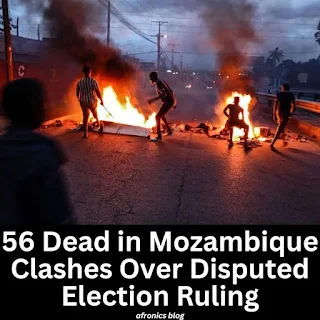Mozambique is currently facing
serious unrest following a controversial presidential election that has
resulted in at least 56 deaths since protests began earlier this week. Many
citizens believe that President-elect Daniel Chapo's victory is not legitimate,
creating a tense and dangerous situation in the country, which is already
weakened by natural disasters and ongoing violence in some areas.
Election Fallout and Growing Unrest
The situation escalated after
Mozambique's Constitutional Council confirmed Daniel Chapo of the ruling
Frelimo party as the winner of the October election, stating he received about
65% of the votes. Opposition leader Venâncio Mondlane, who received roughly
24%, claims the election was full of fraud. He has called for international
help and organized large protests to challenge Chapo’s win.
There have been many reports of
irregularities in the election process, including problems with voter
registration and vote counting. This has led to widespread anger among citizens
who took to the streets to voice their concerns, creating chaos by burning
tires, blocking roads, and clashing with police.
Escalating Violence and Chaos
The unrest has caused several
alarming events, including:
Prison Break: More than 1,500
inmates escaped from Maputo Central Prison amid the chaos, leading to violent
confrontations that killed 33 inmates. While authorities have recaptured some
escapees, many remain at large, raising fears of increased crime.
Property Damage:Hundreds of
buildings like schools, hospitals, and police stations have been looted or
vandalized. In Maputo, the capital, piles of garbage have built up as residents
form groups to defend their neighborhoods from looting and violence.
Economic Impact:The unrest is
causing serious economic issues, leading to shortages of essential supplies
like food and fuel. Supermarkets are running low as people panic buy, and
prices are soaring. Additionally, several airlines have stopped flights to
Maputo, further disrupting trade with neighboring countries.
Human Rights Concerns
The actions of security forces
during this unrest have raised serious concerns about human rights. Many
reports indicate that authorities have used excessive force, including live
ammunition against protesters. Since the election, at least 150 people are thought
to have died, and over 100 have been arrested, leading to calls for
accountability.
A Country Already in Distress
Mozambique is already struggling
to recover from the devastating effects of Cyclone Chido, which killed 120
people and displaced many more. Additionally, the ongoing insurgency in the
Cabo Delgado region is further destabilizing the economy and society.
Regional Concerns
The violence in Mozambique has
raised alarms in southern Africa. South Africa, Mozambique's neighbor, is
taking precautions by strengthening its borders to prevent unrest from
spreading and is urging peaceful dialogue to stabilize the region.
A Call for Solutions
Mozambique is at a crucial point,
facing the important question of whether its leaders will work together to promote
unity and dialogue or whether the cycle of violence will only continue. As the
death toll rises and frustration grows among the public, the key question
remains: can meaningful conversations happen to restore peace, stability, and
trust in Mozambique's democratic process?
Given these events, what specific actions should the Mozambique government and the international community take to ease the crisis and foster long-lasting solutions?
